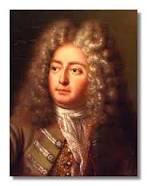May 29, 2017. A different Les Six. No less than six noted composers were born this week. None of them arrived at the pinnacle of their profession, but all six are very interesting in one way or another. Chronologically, the composers are: Georg Muffat, Marin Marais, Mikhail Glinka,  Edward Elgar, Isaac Albéniz and Erich Wolfgang Korngold. Muffat and Marais were born just three years apart: Muffat on June 1st of 1653 and Marais – on May 31st of 1656. They even had the same teacher, Jean-Baptiste Lully. In all other respects, their lives and their music were very different. Muffat, of Scottish and French descent, led a peripatetic life. Born in the Duchy of Savoy, he studied in Paris, then worked in Alsace before settling in Vienna. From there he traveled to Prague and, eventually, Salzburg. There he worked for the archbishop, as Mozart would 100 years later. After a ten year stay in Salzburg he went to Rome where he met Arcangelo Corelli and many other famous musicians of the day. He returned to Salzburg two years later but didn’t stay long. He moved to Augsburg, Bavaria, and later – to Passau, where he lived the remaining years of his life. He died in Passau, 50 years of age, on February 23rd of 1704. Marais, on the other hand, was born in Paris and died in Paris. He went to the choir school of St Germain-l'Auxerrois, one of the best music schools in Paris. He studied the viol with several teachers, one of whom was the famous player Sainte-Colombe (it’s said that Marais surpassed him after six months of study). He was invited to play at the orchestra of the Opera, where Lully was the music director.
Edward Elgar, Isaac Albéniz and Erich Wolfgang Korngold. Muffat and Marais were born just three years apart: Muffat on June 1st of 1653 and Marais – on May 31st of 1656. They even had the same teacher, Jean-Baptiste Lully. In all other respects, their lives and their music were very different. Muffat, of Scottish and French descent, led a peripatetic life. Born in the Duchy of Savoy, he studied in Paris, then worked in Alsace before settling in Vienna. From there he traveled to Prague and, eventually, Salzburg. There he worked for the archbishop, as Mozart would 100 years later. After a ten year stay in Salzburg he went to Rome where he met Arcangelo Corelli and many other famous musicians of the day. He returned to Salzburg two years later but didn’t stay long. He moved to Augsburg, Bavaria, and later – to Passau, where he lived the remaining years of his life. He died in Passau, 50 years of age, on February 23rd of 1704. Marais, on the other hand, was born in Paris and died in Paris. He went to the choir school of St Germain-l'Auxerrois, one of the best music schools in Paris. He studied the viol with several teachers, one of whom was the famous player Sainte-Colombe (it’s said that Marais surpassed him after six months of study). He was invited to play at the orchestra of the Opera, where Lully was the music director.
As composer, he wrote mostly for his instrument, the viol, eventually writing five books of Pièces de viole. Some of his pieces were performed in Versailles and were well received. He became a conductor of the opera around 1706 (the official title of the conductor was “batteur de mesure” – the one who beats the measure; that was the extent of conducting in the early 18th century, and that’s also what lead to Lully’s demise, when he hit his foot with the conducting staff and died of the gangrene several days later). Here is Marais, Le Labyrinthe, from Suitte d'un gout etranger, which in turn is from Book IV of PiècesDe Viole. Jordi Savall and friends are performing. As for Muffat, we’ll hear a piece from the second set of suites which Muffat gave the Latin name of Florilegium (“Selection”). He wrote two sets, Florilegium Primum and Florilegium Secundum, each set consisting of several suites of dances. Here is the second suite from Florilegium Secundum subtitled Laeta Poesis. You may hear some Lully in it, but it also anticipates Handel. The Academy of Ancient Music is conducted by Christopher Hogwood.
Mikhail Glinka, born a century and a half later, on June 1st of 1804, occupies a special place in the history of Russian music. It’s not very often that we can identify the “first composer,” but that’s really what he was - the first authentically Russian composer. Of course, there were Russians composing secular music well before Glinka, Bortniansky and Berezovsky among them, but those, while quite gifted, mostly repeated the patterns of their Italian teachers. Glinka’s music, on the other hand, was original, he went to the Russian sources and created a melodic world that affected generations of composers to come, from the Mighty Five who followed him to Tchaikovsky and the more conservative Soviet composers of the 20th century. Here’s one of his better-known pieces, the Overture to the opera Ruslan and Lyudmila. Evgeny Mravinsky conducts the Leningrad Philharmonic Orchestra.
Edward Elgar and Isaac Albeniz were also born three years apart, Elgar on June 2nd of 1857, Albeniz – on May 29th of 1860. Both became “national composers,” Elgar almost officially, with his Pomp and Circumstance Marches being played at state events, Albeniz – purely by virtue of his music. Both deserve proper treatment, hopefully soon. And so does Erich Wolfgang Korngold, a child prodigy whose career never reached promised heights.
| Source: | https://www.classicalconnect.com/node/12162 |
| Website: | Classical Connect |